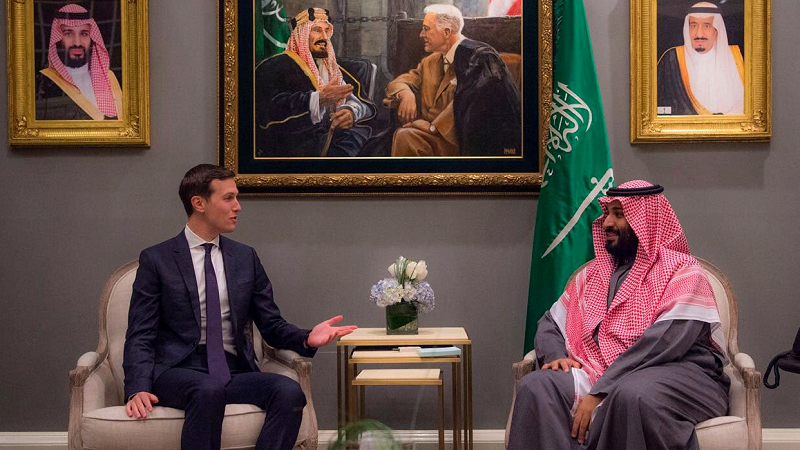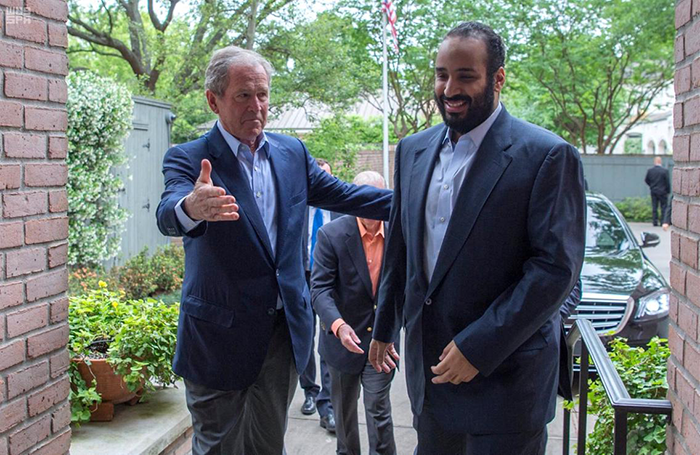Bin Salman Repeatedly Lied During US Visit
Normalcy and Bani Sa‘ud: not a stable marriage
Developing Just LeadershipYusuf Dhia-Allah
Sha'ban 15, 1439 2018-05-01
News & Analysis
by Yusuf Dhia-Allah (News & Analysis, Crescent International Vol. 47, No. 3, Sha'ban, 1439)
On his three-week pilgrimage to the US (March 19– April 9), Muhammad bin Salman missed no opportunity to tell big lies in order to give the impression of being “normal” and catching up with modernity. His biggest lie, endlessly repeated was that before 1979, Saudis were “normal people.” “We were living a very normal life like the rest of the Gulf countries,” he told CBS’ program, “60 Minutes.” “Women were driving cars, there were movie theatres in Saudi Arabia; women worked everywhere. We were normal people developing like any other country in the world until the events of 1979.”
“Saudi” Arabia has been anything but normal since Bani Sa‘ud grabbed power in 1924–1925. They perpetrated gruesome massacres of pilgrims and residents in al-ˇa’if, Makkah, and Madinah. Numerous authors have meticulously documented these crimes (David Howarth, The Desert King: A life of Ibn Saud, London, UK, 1984, p. 143; and Ibrahim al-Rashid (editor), Documents on the History of Saudi Arabia, Volume II, Documentary Publications, Salisbury, NC, US, 1976, pp. 163–67). In Madinah, the city of the noble Messenger (pbuh), the Najdi hordes even raped women.
They have distorted the message of Islam, violated the sanctity of its sacred places, imposed savage laws far removed from the principles of Islam and indulged in other barbaric practices. They have also destroyed many historical places and wiped out vital landmarks of Islamic history.
The very name Saudi Arabia is shirk; it amounts to claiming that the Bedouin family from the backwaters of Najd owns this land (nastaghfir-allah). The noble Messenger (pbuh) had named it “The Arabian Peninsula.” Throughout history, successive generations of Muslims adhered to this name until Bani Sa‘ud erupted on the scene. They were British agents and have now become agents of imperialism and Zionism.
Let us recall what exactly did Bin Salman (BS) meant when he referred to the year 1979. In November of that year, as the new Islamic hijri century (1400ah) began, a group of people led by Juhayman al-‘Utaybi wanted to overthrow the decrepit dynasty. Juhayman and his followers were the children of the Ikhwan that ‘Abd al-‘Aziz ibn Sa‘ud had betrayed and then slaughtered in 1929, again with British help (British planes had bombed the Ikhwan fighters killing virtually all of them).
When news of Juhayman’s uprising leaked out, the group sought refuge in al-Masjid al-Haram, the holiest of Islam’s sanctuaries where no argument and altercation, much less violence or killing, are permitted. Juhayman had hoped that Bani Sa‘ud would not violate the sanctity of the Haram, something that even the mushriks at the time of the noble Messenger (pbuh) did not do.
Bani Sa‘ud, however, proved worse than the Makkan mushriks. Instead of trying to find a negotiated solution to the problem — and it was possible — they brought mercenaries from Morocco, Jordan and even non-Muslim French commandos to attack the Haram.
According to the Bani Sa‘ud’s own rules, non-Muslims are prohibited from entering the boundaries of the Haram. So on what basis did they bring not only heavily armed Moroccan and Jordanian troops but also French commandos? Their court clergy came to the rescue with a fatwa. Shaykh ‘Abd al-‘Aziz ibn Baz, blind from childhood, and his coterie of equally primitive fellow clerics, willingly issued a fatwa allowing armed assault on the Haram and the people who had sought sanctuary there.
The Najdi Bedouins have little regard for Islamic injunctions as was evident in their massacre of pilgrims in 1924–1925 and the rape of Muslim women in Madinah. In 1979, once the hired mercenaries assaulted the Haram, most of Juhayman’s followers including women and children were killed. The floor of the Haram was splattered with blood. Those who were captured alive, including Juhay-man, were publicly beheaded.
The religious establishment, however, demanded its pound of flesh. They were granted vast new powers. This was a quid pro quo for their fatwa in violation of a clear Qur’anic injunction that declares Makkah, and especially al-Masjid al-Haram and its precincts, as an abode of peace and safety (2:125).
True, since the November 1979 uprising against Bani Sa‘ud rule, the court clergy have become more brazen in their pronouncements but to suggest that life was “normal” prior to that is a complete lie. As Jamal Khashoggi, the Saudi journalist who had to flee the country, wrote in an op-ed in the Washington Post, “Women weren’t driving cars [before 1979]. I didn’t see a woman drive until I visited my sister and brother-in-law in Tempe, Arizona, in 1976” (April 5, 2018).
Khashoggi suggests that restrictions on women intensified not merely in the aftermath of the November 1979 uprising but predate them by many years. He links it to the attempt by “…a 19-year-old Saudi princess who tried to flee the country with her lover. They were both executed in 1977; the episode was the subject of a 1980 British documentary drama Death of a Princess. The reaction of the government to the princess’ elopement was swift: the segregation of women became more severe, and no woman could travel without the consent of a male relative.”

So why is BS so keen on advan-cing a new narrative that is divorced from the reality of life in Saudi Arabia? The aim is to promote his own agenda, presenting himself as a “moderate” and “modernizer.” While the West and especially opinion makers in the US are aware of the grim reality facing people in the medieval kingdom, they are willing to accept BS’ false narrative because they have their eyes on the Kingdom’s wealth.
During the March 20 meeting in the White House, Donald Trump brought out a chart that illustrated the “beautiful weapons” Saudi Arabia will buy from the US. At one point, Trump told BS, “Saudi Arabia is a very wealthy nation, and they’re going to give the United States some of that wealth…”
Later, referring to a $600 million deal, Trump said to BS, “That’s peanuts for you.” The intent was clear: you (the Saudis) have lots of cash and America wants that or else. BS cannot say “no” if he hopes to become king for which he needs Trump’s nod.
Khalid bin Farhan Al Sa‘ud, a dissident Saudi prince who fled the country because of his criticism of the family’s dealings, revealed in an interview with German-based Arabian TV channel Al-Hewar that Trump has demanded Saudi Arabia’s recognition of Israel before he would agree to BS’ accession to the throne! In response to a question from Jeffrey Goldberg of Atlantic magazine (April 2), BS said Israel has the “right” to its own “homeland.” The master-slave relationship could not be clearer.
During the many media interviews with BS, not once did the subject of the incarceration of thousands of political prisoners or public beheadings of people come up. The Saudi head-choppers are busy as ever; in fact many are doing overtime. Nor did the slaughter of Yemeni civilians in which the US and Britain are equally involved, come up.

The fawning US media concentrated on how “charming” the prince was, especially his “normalcy” in the matter of gambling casinos, cinemas, and live concerts and beach resorts on the Red Sea where everything will be allowed: bikinis, gambling, and alcohol. It is almost like bringing the French Riviera to the Red Sea. These are truly “revolutionary” steps for an archaic kingdom that has so far severely restricted any form of entertainment by denouncing it as bid‘ah or haram (forbidden).
Despite BS’ embrace of hedonism, what is still absolutely forbidden is any criticism of regime policies. One imam in Jeddah found this out in February when he criticized the opening of casinos and beach resorts during his Jumu‘ah khutbah. The mukha-barat (intelligence agents) promptly arrested and dragged him down from the minbar. Not one member of the congregation intervened at this brazen assault in the masjid during Jumu‘ah. Had they done so, they too would have been arrested and thrown in jail.
It is clear, there are limits to BS’ “moderation.” Human and political rights are off limits. These, however, are of little or no concern to US officials or their equally subservient media so long as the Kingdom is willing to serve American interests.

